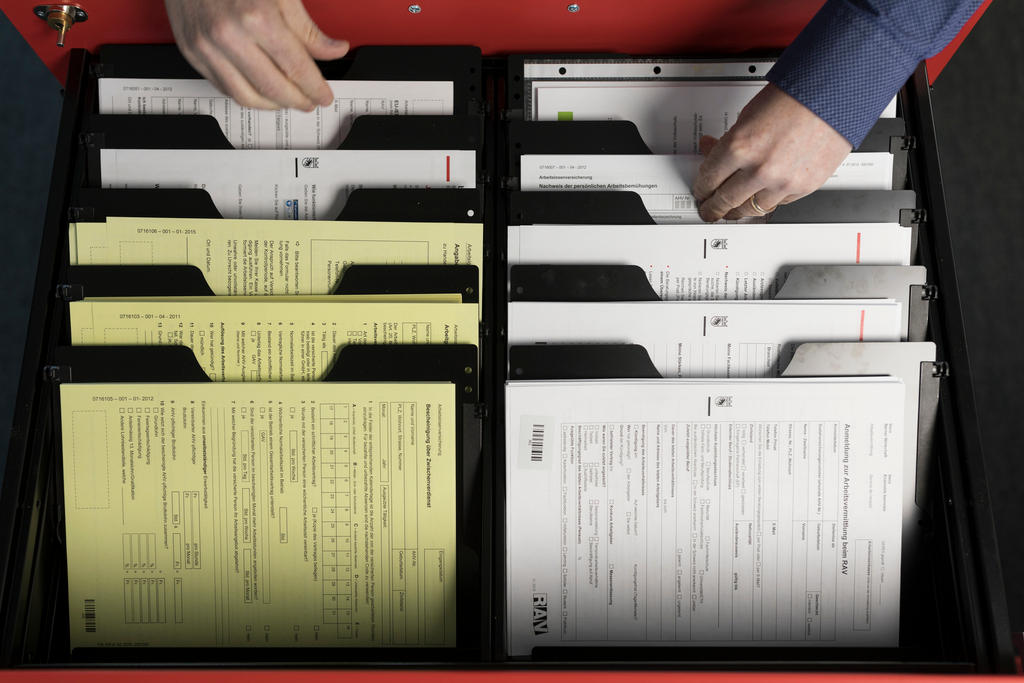
Want a job in Switzerland? Take a hint from top companies

swissinfo.ch readers dive into our content in ten languages and come from all over the world. No wonder one of their most recurring questions is: How do I get a job in Switzerland?
The Alpine nation is home to thousands of foreign and Swiss multinational corporations, many of them with compelling opportunities for the globally minded and multilingual professional.
We asked some of Switzerland’s largest multinational companies, representing an array of sectors, what they look for in a candidate. The answers yielded some clear trends but also some interesting caveats.
Matchmaking 101
Having Nestlé, Roche, Glencore, ABB or LafargeHolcim on your business card might sound great but don’t waste time if you don’t have the skills and expertise needed for the job. Hiring managers at all five companies highlighted first and foremost the importance of meeting the technical requirements of any given position. Being in sync with company values and developmental potential came a close second. Multinationals want to hire people who get their mission and can evolve with them.

More
Recognising foreign qualifications
“At Roche in Switzerland we have about 14,000 employees with more than 140 different kind of job profiles. Therefore, the variety of the professional and personal qualities we are looking for is equally diverse,” says Wiebke Bräuer, head of talent scouting at Roche, a leading Swiss pharmaceutical firm with headquarters in Basel. “Generally speaking we are looking for people who share our company values and who have development potential for future career development moves.”
Understanding what a company does can be as important as being in tune with how it does it. ABB, a Swedish-Swiss multinational operating in robotics and automation technology areas, has developed an elaborate values-based competency model describing the behaviors they seek in all employees. These cover a spectrum of qualities ranging from innovation and speed to customer focus and quality. Every job candidate is measured against that matrix.
Disrupted world
“As a pioneering technology leader in an increasingly disrupted world, we also seek in candidates, resilience, an ethos of partnership, learning agility/speed of learning, ability to work with, through and in virtual worlds, and a digital mindset,” says Prasad Swaminathan, ABB’s head of talent and learning. The company has about 147.000 employees from 162 nationalities, most of them white collar workers, although it boasted approximately 270 manufacturing sites as of June 2018.
Emphasis on digital know-how was also evident at LafargeHolcim, a global building materials and solutions company, with a workforce of 81,960 employees worldwide, including nearly 2,000 workers in Switzerland. “We look for people with integrity and an entrepreneurial mindset and who are results-driven, collaborative and digitally savvy,” says Cláudio Nagib Calçada, group head of talent management at LafargeHolcim.
Nuts and bolts
The format of your resume matters less than its clarity. If you are applying for an entry-level or junior position, companies will pay a closer look at your education, degrees and extra-curricular activities. For senior roles, greater weight is attached to previous work experience as well as management and leadership skills. When making an international hire, the candidate’s ability to adapt to a new culture and operate in a multicultural environment are taken into account, as well as what they bring to the company that can’t be found in the local talent pool.
“The art is to describe and summarize your career in a way that triggers the curiosity of the hiring manager to pick up the phone and invite you for an initial discussion,” says Calçada.
To impress your potential bosses, best have a good rapport with your former employers, although multinational companies give different weight to references and recommendation letters. Both are important at LafargeHolcim. Roche cares more about experience but might require “a certificate of good conduct” for some positions. Nestlé systematically considers reference letters in latter stages of the recruitment process and rarely considers spontaneous applications. Do not let that deter you from trying your luck at the other multinationals as they might at a minimum keep your resume on file.
The interview: be prepared and be yourself
Congratulations! You landed the interview. If you are not in Switzerland, odds are the first round(s) will take place over the phone or even Skype. But most MNCs will level the geographical playing field by providing the opportunity for a face-to-face interview in the final stage of the hiring process. Word of advice? Be prepared and be yourself. The consensus is loud and clear on that one. Don’t fumble on the “what do you know about us” question and definitely take the opportunity to raise questions of your own.
“It may sound logical and simple, but you will be quite surprised to see how many candidates don’t do this properly,” says Gerda Schwindt, head of human resources at Glencore, a Swiss multinational commodity trading and mining company with headquarters in Baar, Switzerland.
“Inform yourself about who we are and what we do so when the question comes you will be able to say more than Glencore was founded in 1974 by Marc Rich.”
Strengths of apprenticeships
Poor preparation is something she has encountered from individuals working across disciplines in both early and more advanced stages of their career. In contrast, the 15 to 16-year-olds who reach Glencore through the Swiss apprenticeship system typically show up very well prepared for interviews, as do college graduates who are hungry for the job. Glencore does not hire traders from other companies preferring to train its own.
For experts – the motives for a career move are particularly important as well as comfort with a non-hierarchical company structure.
“Unlike with the financial services, you can’t just climb up the ladder at Glencore,” says Schwindt. “Our organizational structure is very lean, really very flat so you must see the value in developing the position along with the company.”
So, how should you prepare? For starters, do thorough research on the company and be clear on what the job entails and how you would fit in the company.
“Extensively research the company and prepare yourself to use such knowledge during the whole interview and not as one standalone statement only,” stresses Calçada of LafargeHolcim. “Learn to listen to your interviewer and learn to listen to yourself. Observe body language. Be yourself.”
“A simple yet useful advice is to read the job description carefully,” says Inge Gratzer, media relations manager at Nestlé, which employs more than 10,000 people in Switzerland with more than 100 different nationalities. “It is highly recommendable to make oneself familiar with the company, its values and history.”
ABB’s Swaminathan recommends understanding where and how the role for which the person is an applicant fits into the company’s strategy and structure. “Do an honest self-assessment of why you think you might be a good fit for the role,” he says.
Languages a must, international experience a plus
Language skills are a big boon if you want to work at a multinational corporation. So is international experience. Since Esperanto never took off, most multinational corporations have made English their working language, particularly at international headquarters.
Other languages are valued in relation to the role and work setting.
In Switzerland, French and German are considered essential for employees working in operational roles or human resources. But so is readiness to work with other cultures.
“This is key whether we hire on a junior or senior level,” notes Schwindt at Glencore. “Even if a person is working locally, we still need to make sure that person has got an international mindset and the tolerance to work with other cultures.”
This is another area of consensus. “Most of the time, language skills are essential while international experience is more dependent on the requirements of each position,” says Nestlé’s Gratzer.
Swaminathan of APP notes having language skills eases the ability to collaborate internationally and provides the employer with the opportunity to move candidates into new geographies as needed.

In compliance with the JTI standards
More: SWI swissinfo.ch certified by the Journalism Trust Initiative































You can find an overview of ongoing debates with our journalists here . Please join us!
If you want to start a conversation about a topic raised in this article or want to report factual errors, email us at english@swissinfo.ch.